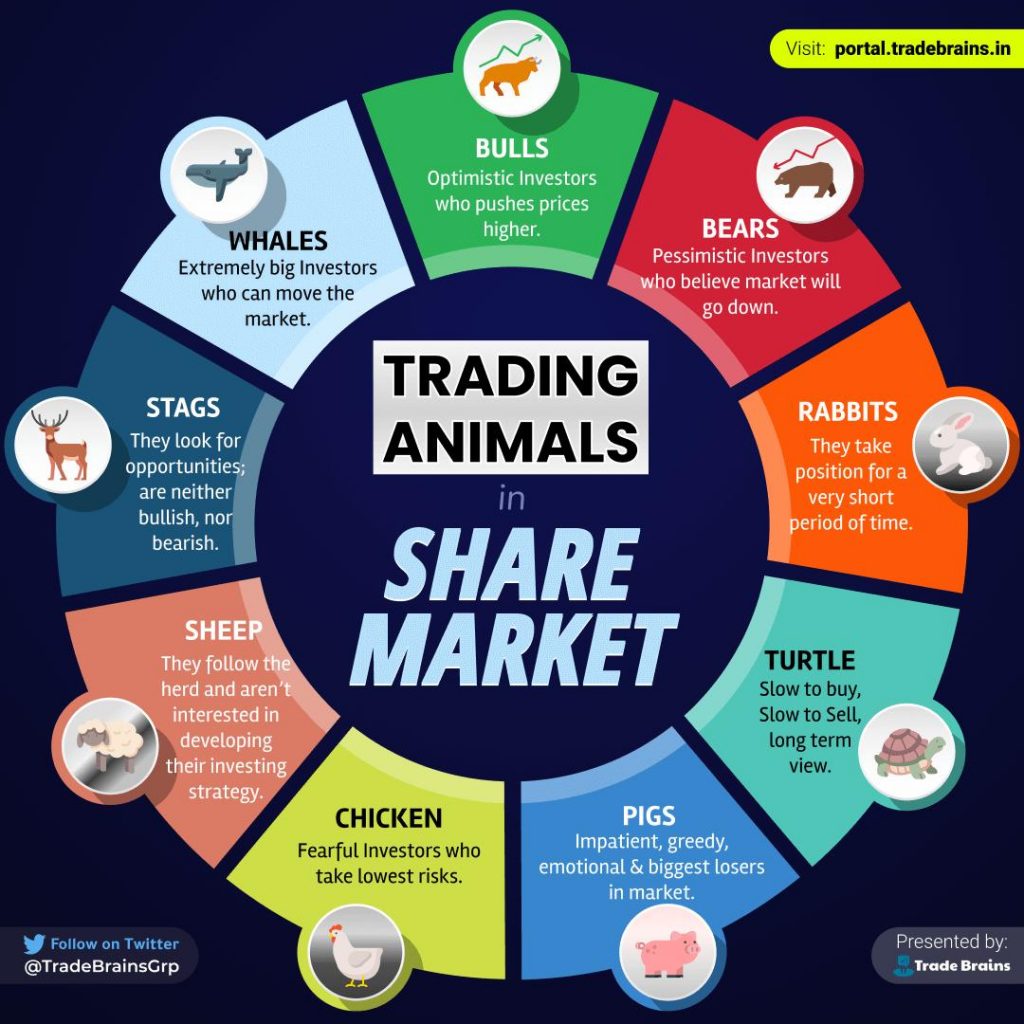List of Most Frequently Used Trading Animals in the Share Market (Bull, Bear, Stags, Wolves & More): Have you watched the movie ‘The Wolf of Wall Street” starring Leonardo DiCaprio as Jordan Belfort? If yes, then have you wondered why he has been referred to as a wolf in the movie? What’s an animal doing in the stock market-based movie?
Well, Animals in the Stock Market are commonly used terminology to define specific characteristics of the type of traders or investors or market scenario. In this article, we are going to discuss 11 of such most commonly used animals in the stock market. Please read the article till the end as there are some bonuses in the last section of this post.
You are watching: 11 Most Frequently Used Trading Animals in the Share Market

11 Most Frequently Used Trading Animals in the Share Market
Here are the eleven most frequently used animals in the share market by stock analysts or the authors of investing books.
1. Bulls – The Optimistic

The bulls represent the investors or traders who are optimistic about the future prospects of the share market. They believe that the market will continue its upward trend. Bulls are the ones who drive the share price of companies higher.
2. Bears – The Pessimistic

Bears are the investors or traders who are totally opposite of the bulls. They are convinced that the market is headed for a fall. Bears are pessimistic about the future aspects of the share market and believe that the market is going to be in RED. Mostly, bears are the reasons for getting the share prices lower.
Quick note: The bulls and bears are often used to describe the market condition. A bull market is a scenario when the market appears to be optimistic and climbing new highs. On the other hand, a bear market describes a market where things are not good and appears to be a long-term decline.
3. Rabbits

The term rabbits are used to describe those traders or investors who take a position for a very short period of time. The trading time of these traders is typically in minutes.
These types of traders are scalpers and trying to scalp profits during the day. They do not want overnight (or long-term) risk and just looking for an opportunity to make some quick bucks for the market during the day.
4. Turtles

The turtles are typically those investors who are slow to buy, slow to sell, and trade for the long-term time frame. They look at the long-term frame and try to make the least possible number of traders. This kind of investor does not care about short-term fluctuations and most concerned with long-term returns.
5. Pigs
“Bulls make money, bears make money, pigs get slaughtered”

These investors or traders are impatient, willing to take high risk, greedy, and emotional. The Pigs don’t do any kind of analysis and always look out for hot tips and want to make some quick bucks from the share market. Pigs are the biggest losers in the stock market.
6. Ostrich

Ostriches are those kinds of investors who bury their heads in the sand during bad markets hoping that their portfolio won’t get severely affected.
These kinds of investors ignore negative news with an expectation that it will eventually go away and will not impact their investments. Ostrich investors believe that if they do not know how their portfolio is doing, it might somehow survive and come out alright.
7. Chickens

Chicken refers to those investors who are fearful of the stock market and hence do not take risks. They stay away from the market risks by sticking to conservative instruments such as bonds, bank deposits, or government securities.
8. Sheeps

Sheep are those kinds of investors who stick to one investing style and do not change according to the market conditions.
They are usually the last ones to enter an uptrend and the last one to get out of a downtrend. The sheep like to be on the side of the majority (herd) and follow a guru. They are not interested to develop their own investing/trading method.
ALSO READ
9. Dogs

Dogs are those stocks that have been beaten down by the market due to their poor performance. Many financial analysts look into the dog stocks closely as they expect these stocks to recover in the upcoming days.
10. Stags – The Opportunistic

This kind of investor or traders are not really interested in a bull or bear market. They just lookout for opportunities. They are neither bullish nor bearish.
For example, Stags can be the traders who buy the share of a company during its initial public offering (IPO) and sell them when the stock is listed and trading commences. They do stag with the hope to get listing gains and hence these individuals are called stags.
11. Wolves

Wolves are powerful investors/traders who use unethical means to make money from the share market. Mostly, these wolves are involved in the scams that move the share market when it comes to light.
Read more : Can You Buy One Stamp At USPS? (All You Need to Know)
For example- Harshad Mehta can be considered the wolf of Dalal Street. He was charged with numerous financial crimes that took place in the Securities Scam of 1992. Similarly, the famous Hollywood movie ‘The Wolf of Wall Street’ depicted Jordan Belfort, who was convicted on charges of stock fraud in his penny stock operation and stock market manipulation.
ALSO, READ
Bonus: Few More Trading Animals
12. Lame ducks
A lame-duck is a type of trader or investor who trades and ends up with a huge loss. Lame ducks have either defaulted on their debts or gone bankrupt due to the inability to cover trading losses. The phrase can be traced to the early years of commodity trading and the development of the London Stock Exchange during the mid-1700s.
13. Hawk & Dove
Hawks and doves are terms used to describe the types of policymakers who take critical stances on different economic situations. It basically suggests the sensitivity of a policymaker is towards an economic situation. A ‘hawk’ wants a tough stance in an economic situation, whereas a ‘dove’ wants to be easy with it.
14. Whales

These are the big investors who can move the stock price when they buy or sell in the market. You can make a lot of money if you trade alongside the right whale.
15. Sharks

Shares are those traders who are just concerned about making money. They get into the trades, make money, and exits the share market. The sharks have very little interest in big complicated methods of making money from the market.
16. Dead Cat Bounce
The dead cat bounce slang is used to refer to a temporary recovery during the bear run. Either it could mean a temporary upswing of the market in the midst of a bear run or it could refer to the particular stock behaviour.
Interestingly, this phrase has been employed from the explanation that if you throw a dead cat against a wall at a high rate of speed, it will bounce – but it is still dead.
17. Dogs of the Dow
This is a popular investing strategy where the investors select the 10 highest dividend-yielding blue-chip stocks from the Dow Jones Industrial Average (DJIA) every year. The main reason to follow the Dogs is that it presents a straightforward formula designed to perform roughly in line with the Dow. This concept was originally published by Michael O’Higgins’ in his book, “Beating the Dow,” in which he also coined the name “Dogs of the Dow.” Similar to this concept, Dogs of the Sensex is used in India.
That’s all. I hope this post on trading animals in the share market is helpful to you. Let me know what kind of trading animal you are- in the comment box. #HappyInvesting.
Stay updated on the latest Stock Market News and Corporate Actions NSE with Trade Brains Portal, while also keeping an eye on the Top Gainers Today in NSE with our Stock Heatmap feature.
Source: https://antiquewolrd.com
Categories: Stamps

